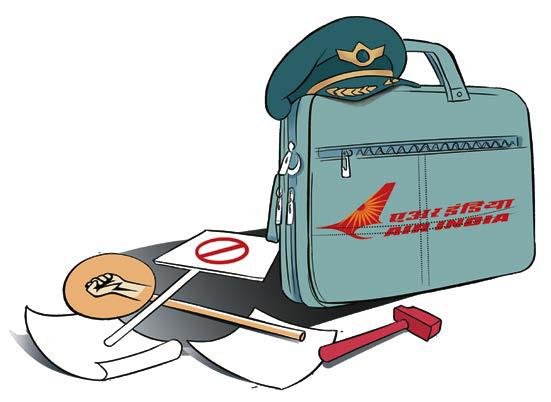Versuchen GOLD - Frei
TATA'S RUNWAY SUCCESS
Outlook Business
|June 2023
THE PILOTS' UNIONS AT AIR INDIA THAT ONCE STRUCK FEAR IN THE HEART OF THE GOVERNMENT AND THE AIRLINE'S POTENTIAL SUITORS HAVE BEEN GROUNDED. IT WAS A BLOODLESS COUP. HOW DID THE TATAS PULL THIS OFF?

IN 2012, THE MANAGEMENT OF GOVERNMENT-OWNED AIR INDIA WAS DOWN ON its knees as the bulk of the Maharaja's international fleet was grounded for 58 days as the Indian Pilots' Guild (IPG), a trade union of the airline pilots, struck work. Air India was estimated to have lost Rs 600 crore in revenue in this period, leading to the management sacking 101 of more than 420 pilots associated with the union. But within a year, all pilots, except 13, were reinstated by the Ministry of Civil Aviation.
Eleven years later, in April 2023, the Air India management-now part of the Tata Group-faced another threat of industrial unrest. Fireworks were expected when around 1,300 pilots, belonging to the IPG and the Indian Commercial Pilots' Association (ICPA), its other union of pilots, announced that they would go to any extent to oppose the management's proposal to implement revised terms of compensation.

The world watched how the Tata Group-known for its harmonious relations with unions in different companies stood up to the challenge posed by the strongest and among the last surviving unions in the country.
Having taken over a company that had incurred accumulated losses of Rs 77,953 crore by the end of 202021, this new contract was a necessary step so the Tatas claimed-to bring a uniform culture among all airlines under the group's aviation portfolio. The showdown was expected. Passengers were jittery about booking Air India flights, and industry watchers from across the globe were excited to see the Tata playbook of dealing with an elite group of workers who knew about their rights and were not afraid of facing the axe to defeat the iron hand of capitalism.

Diese Geschichte stammt aus der June 2023-Ausgabe von Outlook Business.
Abonnieren Sie Magzter GOLD, um auf Tausende kuratierter Premium-Geschichten und über 9.000 Zeitschriften und Zeitungen zuzugreifen.
Sie sind bereits Abonnent? Anmelden
WEITERE GESCHICHTEN VON Outlook Business

Outlook Business
'Bolstering Local Supplier Ecosystem Critical for Manufacturing Push'
From de-risking energy shift to AI impact, Shveta Arya, managing director, Cummins India, talks about the five ways the power-systems sector is being reshaped
1 min
March 2026

Outlook Business
Capital Goes Where It Finds Returns. Right Now, That's India
Manisha Girotra, chief executive, Moelis India, tells Ashutosh Mishra why India’s funding story is now structural, not cyclical. Edited excepts
3 mins
March 2026

Outlook Business
Prioritising Rare Earths
Last year, the world received a powerful reminder of how fragile global supply chains can be. When China tightened export restrictions on rare earth elements, the shockwaves hit EVs, defence and renewable energy instantly. It reinforced a new geopolitical reality: the future will be shaped not just by capital, but by access to critical minerals and the ability to build resilient value chains around them.
3 mins
March 2026

Outlook Business
Building an Empire
Long before Zomato became a household name, a young and restless IIT Delhi graduate was dreaming up India's first online food court and hoping to escape the placement rat race
4 mins
March 2026

Outlook Business
INVEST TODAY FOR A SECURE TOMORROW
Policymakers, regulators and industry leaders chart a new roadmap for financial security in an ageing India at the fourth edition of IDFC FIRST Bank presents Outlook Money 40After40 Retirement and Financial Planning Expo
7 mins
March 2026

Outlook Business
Geopolitics Shackles Green Switch
Over 70% respondents say geopolitics has moderate to significant influence on their organisation's sustainability strategy, according to a recent survey
5 mins
March 2026

Outlook Business
More Glitter Than Gold
India's AI extravaganza holds a mirror to its empty stables in the segment, but also shows a pathway for course correction
6 mins
March 2026

Outlook Business
Threads of Time
Founded in 1971, a heritage silk saree house has evolved from a neighbourhood store into one of India's fastest-growing traditional retailers
5 mins
March 2026

Outlook Business
Difficult but Doable
India's commitment to achieve net-zero emissions by 2070 will entail a long-term fundamental transformation of the entire economy. This transition can strengthen growth rather than constrain it. The nearer milestones of 2030 are ambitious and challenging. The headline number is the creation of 500GW of fossil-fuel-free capacity. On this we are on track.
3 mins
March 2026

Outlook Business
Rough Road to Decarbonisation
Technology-readiness gaps, policy uncertainty, limited access to green finance and lack of green demand remain the biggest challenges for companies to decarbonise
6 mins
March 2026
Translate
Change font size
